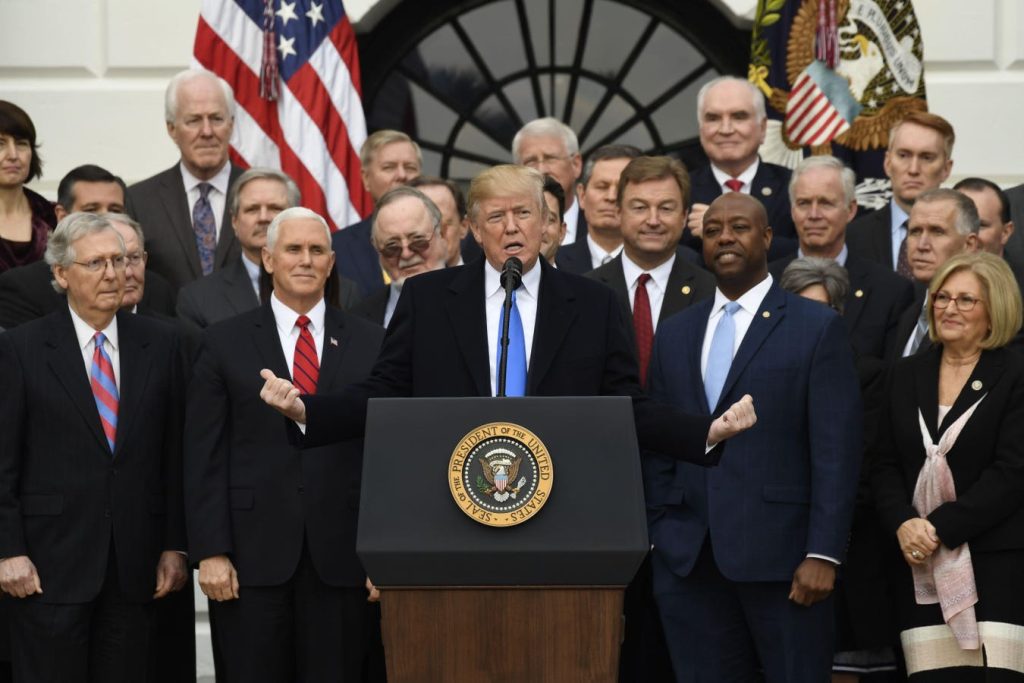2025 Tax Landscape: A Year of Uncertainty and Potential Change
The year 2025 is poised to be a pivotal one for the American tax system. With the sunset of numerous provisions within the Tax Cuts and Jobs Act (TCJA) looming at the end of the year, individuals and businesses are grappling with uncertainty about their future tax liabilities. While the precise contours of tax reform remain unclear, the political climate, legislative priorities, and stated intentions of policymakers offer valuable clues about the potential direction of tax policy.
The legislative process for enacting new tax laws is a complex and often arduous one. Any proposed changes must first navigate the House of Representatives, currently held by a slim Republican majority. This narrow margin, further complicated by upcoming vacancies, presents a significant challenge for passing major legislation. Following House approval, the bill proceeds to the Senate, where Republicans hold a slightly larger, but still tenuous, majority. Finally, any legislation passed by both chambers requires the signature of the President to become law.
The Republican Party’s ambitious legislative agenda for 2025, coupled with their slim congressional majorities, creates a challenging political landscape. Beyond tax reform, Congress must address critical issues such as confirmation hearings for the new administration, the federal budget, and the impending debt ceiling. These competing priorities may delay progress on tax legislation, potentially pushing it into the latter half of the year. To expedite the process, Republicans are likely to utilize the budget reconciliation process, which allows certain budgetary measures to pass the Senate with a simple majority, bypassing the usual 60-vote threshold. However, reconciliation is restricted in its scope and may necessitate dividing the legislative agenda into multiple bills, possibly separating immigration and energy policy from tax reform.
The content of a potential tax bill is currently the subject of intense debate and speculation. While nothing is finalized, several key issues are likely to be at the forefront of discussions. The fate of expiring TCJA provisions is a central concern. Some provisions may be extended in their current form, while others could be modified or allowed to lapse entirely. The $10,000 cap on the State and Local Tax (SALT) deduction, a contentious element of the TCJA, is likely to be revisited, with representatives from high-tax states advocating for its repeal or modification. Corporate tax rates, the child tax credit, the taxation of overtime and Social Security benefits, green energy subsidies, and international trade tariffs are all potential points of contention and negotiation.
Reaching a consensus on these complex issues within the Republican party will be a significant challenge. Internal divisions, particularly regarding the SALT deduction and the extent of corporate tax cuts, could derail or significantly alter the shape of any proposed legislation. The ability of party leaders to navigate these competing interests and forge a compromise acceptable to a majority of their members will be crucial to the success of any tax reform efforts.
The uncertainty surrounding tax policy in 2025 presents both challenges and opportunities for taxpayers. While the final outcome remains unknown, proactive planning and informed decision-making can help individuals and businesses navigate this period of transition. Staying abreast of legislative developments, consulting with qualified tax professionals, and exercising patience throughout the lengthy legislative process are essential strategies for mitigating potential risks and maximizing potential benefits under the evolving tax code.
Taxpayers should anticipate a period of protracted debate and negotiation throughout 2025, with the final shape of tax legislation likely to emerge only in the latter half of the year. This uncertainty underscores the importance of remaining informed about proposed changes and seeking expert advice from CPAs or tax advisors. These professionals can help individuals and businesses understand the potential implications of various proposals, develop tax-efficient strategies, and adapt to any changes that ultimately become law. While the complexities of the legislative process and the political dynamics at play make precise predictions impossible, proactive planning and a thorough understanding of the ongoing debate are crucial for navigating the uncertain tax landscape of 2025.
The expiring provisions of the TCJA have far-reaching consequences, affecting individuals, families, and businesses across the economic spectrum. The potential changes being debated will have significant impacts on income tax rates, deductions, credits, and business taxation. For individuals, potential changes to the child tax credit, the SALT deduction, and the taxation of retirement income could significantly impact household finances. Businesses face uncertainty regarding corporate tax rates, expensing provisions, and other tax incentives. The ultimate outcome of these debates will determine the winners and losers under the reformed tax code.
The political maneuvering around tax reform will be a defining feature of the 2025 legislative landscape. The Republican Party’s narrow majorities in both chambers of Congress create a delicate balance of power, giving outsized influence to individual members and factions within the party. The ability of leadership to maintain party discipline and secure the necessary votes will be critical to the success of their legislative agenda. External pressures from interest groups, lobbyists, and public opinion will also play a significant role in shaping the final outcome.
The impending changes to the tax code have the potential to reshape the American economy. Changes to corporate tax rates, investment incentives, and international trade policies could influence business decisions, investment flows, and job creation. Modifications to individual tax rates and deductions could affect consumer spending and overall economic growth. Understanding the potential macroeconomic consequences of various tax proposals is essential for informed policymaking and effective economic planning.
Throughout the year, taxpayers should prioritize staying informed about the evolving tax landscape. Reputable news sources, government websites, and professional tax organizations can provide valuable updates on legislative developments and analysis of their potential impacts. Engaging with these resources will empower taxpayers to make informed decisions and prepare for any changes that may affect their financial well-being.
Working with a qualified tax professional is crucial for navigating the complexities of tax reform. CPAs and tax advisors can provide personalized guidance based on individual circumstances, analyze the potential impacts of proposed changes, and develop tailored strategies for tax planning and compliance. Their expertise can help taxpayers minimize their tax burden and maximize their financial outcomes under the new tax regime.
Patience is essential throughout the legislative process. Tax reform is a complex and often protracted undertaking, with numerous twists and turns along the way. The final outcome may not be clear until late in the year, and even then, implementation and interpretation of new laws can take time. Maintaining a long-term perspective and avoiding impulsive reactions to interim developments is crucial for sound financial planning.
While the specific details of tax reform in 2025 remain uncertain, the potential for significant change is undeniable. By staying informed, seeking professional advice, and exercising patience, taxpayers can navigate this period of uncertainty and position themselves for success under the evolving tax landscape. The year 2025 promises to be a pivotal one for American tax policy, with far-reaching consequences for individuals, businesses, and the economy as a whole.












